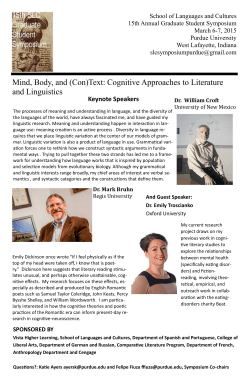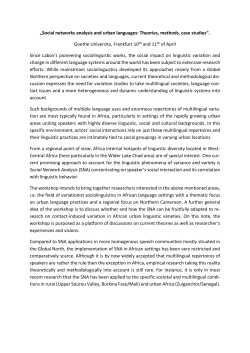
Planning for Assessment in Language Programs: A
Planning for Assessment in Language Programs: A Practical Tool Melody Ann Ross University of Hawaiʻi at Mānoa 4th International Conference on Language Documentation and Conservation Honolulu, HI 27 February, 2015 Mahalo, Obrigada, Thank You The University of Hawaiʻi at Mānoa, Department of Linguistics The Democratic Republic of Timor-Leste, Ministry of Education US Department of State, Institute of International Education, The Fulbright-Clinton Public Policy Fellowship ! Language Programs don’t plan for assessment. ! Language Programs should plan for assessment. ! Assessments should attempt to nourish the body of linguistic knowledge. ! How do you do this? ! If it’s too late, what can you do? ! Emphasis on implementation ◦ Successful implementation = successful program? ! CEFL and ACFTL proficiencies, but no provisions for assessment ! UNESCO ! Malone, Susan. 2010. Planning Mother Tongue Based Education Programs in Minority Language Communities. SIL. Dallas. ! Cessation of funding: ◦ Evaluations are increasingly required by nonprofit funders as verification that the nonprofits are indeed helping their constituents. ! You might not be doing what you think you’re doing: ◦ Evaluations can identify program strengths and weaknesses to improve the program. ! Waning community support: ◦ Produce data or verify results that can be used for public relations and promoting services in the community. ! Hurts legitimacy. ! 2012 – MTB-MLE (UNESCO) ◦ Mother-Tongue Based Multilingual Education ◦ 3 languages, 12 pilot schools ◦ no formal assessment in ToR ! 2013 – first call for assessor ! 2014 – second call for assessor ! 2015 – problems with consistency, legitimacy, and politics ! Assessments are often not linguistically or theoretically sound. ◦ Move Forward (NGO) ! They could be a tool to add to the existing body of language literature. ! Track age and level appropriate development. ◦ Must be appropriate to the goals of the program (literacy, acquisition, etc.) ! Multi-level program assessment ! Multi-level community assessment ! Multi-level linguistic assessment ! Multi-level program assessment ! Multi-level community assessment ! Multi-level linguistic assessment ! 1. Context: ◦ define the situation before the program begins, ◦ identify the goals and assess the needs of the community, ◦ attempt to diagnose the problems underlying the needs, and ◦ identify the external factors that will affect the program ! 1. Context ! 2. Input ◦ discover potential resources, ◦ learn about other programs/activities in the community that might collaborate ◦ identify and describe potential stakeholders in the program ! 1. Context ! 2. Input ! 3. Process: ◦ identify strengths and weaknesses of the program plan and implementation, ◦ provide information to stakeholders and ◦ keep a record of the implementation process and its impact on the community ! 1. Context ! 2. Input ! 3. Process ! 4. Impact: ◦ relate the outcomes of the program to the original situation, ◦ the goals and needs identifies by the community, ◦ the objectives described in the program plan, ◦ and the resources that were available to the program ! 1. Context ! 2. Input ! 3. Process ! 4. Impact ! Where do you get this data? ◦ Interviews, surveys, meeting notes, proposals, budgets, anything from which you can glean intent ! Multi-level program assessment ! Multi-level community assessment ! Multi-level linguistic assessment ! Community member attitudes ◦ Above all, they deserve to know how the program is going. ! Outsider attitudes ◦ Decision-makers sometimes come from outside and it is important to keep track of their perceptions. ! Teachers’ performance ◦ Teachers need to feel supported and looked-after. ! Multi-level program assessment ! Multi-level community assessment ! Multi-level linguistic assessment ! Traditional Benchmarks: listening, speaking, reading, writing ! Linguistic/Acquisition Benchmarks ◦ Phonological development ◦ Morphological development ◦ Grammatical stuff: Relationships, hypotheses, passives ◦ Discourse competence and constructing dialogues ! Linguistic/Acquisition benchmarks ◦ Phonological development: Pronunciation and lexical recall ! Linguistic/Acquisition benchmarks ◦ Phonological development ◦ Morphological development: Ownership, location, plurals/classifiers ! Can you tell me where the ball is? ! Can you tell me where the lamp is? ! Can you tell me how many people are on the bus? ! Linguistic/Acquisition benchmarks ◦ Phonological development ◦ Morphological development ◦ Grammatical stuff: Relationships, hypotheses, passives ! Can you tell me what’s happening in this picture? ! Cinto got a new ball today. What do you think he will do tomorrow? ! Can you tell me what’s happening to the cat in this picture? ! Linguistic/Acquisition benchmarks ◦ Phonological/pronunciation ◦ Morphological/ownership, location, ◦ Grammatical stuff/relationships, hypotheses, passives ◦ Discourse competence and constructing dialogues ! Can you tell me what these people are saying to each other? ! What do you need to do assessment? ◦ Getting started and setting goals ! What do you do with the data? ◦ Organizational tips for spreadsheets, basic analysis tools, basic statistics ! How do you make recommendations? ◦ Really carefully! ! Each part of the assessment ought to be considered for use, but varied to fit context. ◦ Scoring - to grade or not to grade? ◦ Level-appropriate tasks ◦ Culturally-appropriate tasks ! Program assessments can be fun! Really! ! They can also be useful to the broader linguistic community. ! (Free, non-copyrighted) Assessment materials are scarce, but I’m working on that. ! Eventually everything will be hosted on my website. (Interview materials are ready now) ◦ melodyannross.me ! ! ! ! ! ! ! ! ! ! ! ! ! ! References, Works Cited and Sources: Alidou, H., A. Boly, et al. 2006. Optimizing Learning and Education in Africa – The Language Factor. Association for the Development of Education in Africa. Paris. Bender, P., Dutcher, N., Klaus, D., Shore, J., and C. Tesar. 2005. Education Notes: In their own language… Education for all. The World Bank. Benson, Carole. 2004. The Importance of Mother Tongue-Based Schooling for Educational Quality. Paper commissioned for the EFA Global Monitoring Report 2005, The Quality Imperative. International Bureau of Education, UNESCO, Geneva. Benson, Carole. 2005. Girls, Educational Equity, and Mother Tongue-Based Teaching. Asia and Pacific Regional Bureau for Education, UNESCO, Bangkok. Bowden, John and Tatiana Romanovsky. 2004. Assessing the degree of language endangerment using Rapid Rural Appraisal techniques. Proceedings: Democratic Republic of Timor-Leste. 2010. Highlights of the 2010 Census Main Results in Timor-Leste. Democratic Republic of Timor-Leste, Dili. Dutcher, Nadine. 2004. Expanding Educational Opportunity in Linguistically Diverse Societies. Prepare for the Center for Applied Linguistics. Washington. Leach, M. 2007a. History Teaching: Challenges and Alternatives. In Kingsbury, D., Leach, M. (eds). East Timor: Beyond Independence. Monash University Press. Clayton, VIC. Leach M. 2007b. Surveying East Timorese Tertiary Students Attitudes to National Identity: 2002-2007. South East Asia Research. Vol. 16, No. 3: 405-431. Lewis, Paul and Gary Simons. 2009. Assessing Endangerment: Expanding Fishman’s GIDS. SIL. Dallas. Lopez, Jose. 2012. Development of Mother-Tongue-Based Early Literacy Assessment Tools for Ilokano Children. Malone, Susan. 2010. Planning Mother Tongue Based Education Programs in Minority Language Communities. SIL. Dallas. Ministry of Education. 2007. National Education Policy 2007-2012: Building Our Nation Through Quality Education. Ministry of Education, Democratic Republic of Timor-Leste, Dili. ! ! ! ! ! ! ! ! ! ! ! ! ! ! ! References, Works Cited and Sources: MoE. 2010a. MTB-MLE for Timor-Leste, National Policy. Ministry of Education, Democratic Republic of Timor-Leste, Dili. MoE. 2010b. National Strategic Development Plan 2011–2030, 2nd Draft. Ministry of Education, Democratic Republic of Timor-Leste, Dili. MoE. 2011. First Languages First: Mother-Tongue Based Multilingual Education for Timor-Leste Implementation Plan. Ministry of Education, Democratic Republic of Timor-Leste, Dili. MTB-MLE Network. (cite this website somehow) Panda, M., Mohanty, A., Nag, S. & Biswabandan, B. Does MLE Work in Andhra Pradesh and Odisha? A Longitudinal Study. NMRC Newsletter Swara. Vol. 1, No. 6-7: 2-23. Pinnock, Helen. 2009. Language and Education: The Missing Link; How the Language Used in Schools Threatens the Achievement of Education for All. CfBT Education Trust and Save the Children Alliance. Quinn, M. 2007. The Challenge of Realising Language and Literacy Goals in East Timor’s Schools. . In: Kingsbury, D., Leach, M. (eds). East Timor: Beyond Independence. Monash University Press. Clayton, VIC. Quinn, M. 2008. Choosing Languages for Teaching in Primary School Classrooms. In: Earnest, J., Beck, M. and L. Connell (eds). Education and Health Rebuilding in Post-Conflict Transitional Society: Case Studies from Timor-Leste. Curtin University Press. Perth. Quinn, M. 2010. Using Talk in Classrooms: Constructing Meaning. In: Leach, M., Mendes, N.C., da Silva, A.B., Ximenes, A.D.C., and B. Boughton (eds). Understanding Timor-Leste. Timor-Leste Studies Association. Melbourne. 235-241. Shah, Ritesh. 2012. Goodbye Conflict, Hello Development? Curriculum Reform in Timor-Leste. International Journal of Educational Development. Vol. 32: 31-38. UNESCO. 2003. Education in a Multilingual World. International Bureau of Education, United Nations Educational, Scientific and Cultural Organization. Paris. UNESCO. 2005. First Language First: Community-based literacy programmes for minority languages contexts in Asia. International Bureau of Education, UNESCO, Geneva. Walter, S. L. & Trammell, K. 2010. The Kom Experimental Mother Tongue Education Project Report for 2010. World Bank, 2010. Progress Made, But Still A Long Way To Go. Babadok: Newsletter of the World Bank in Timor-Leste. Obrigada ba tempu!
© Copyright 2025
![発表資料(東洋大学橋本工) [PDFファイル]](http://cdn1.abcdocz.com/store/data/000821790_1-f7630413117a07a3702c79f4129fbca8-250x500.png)








